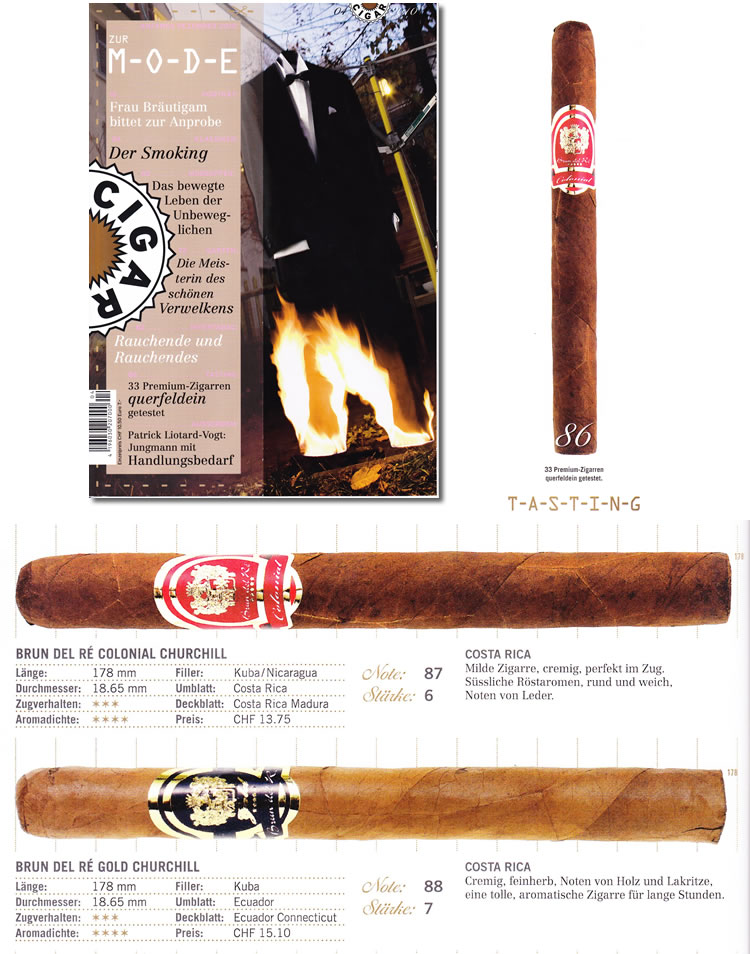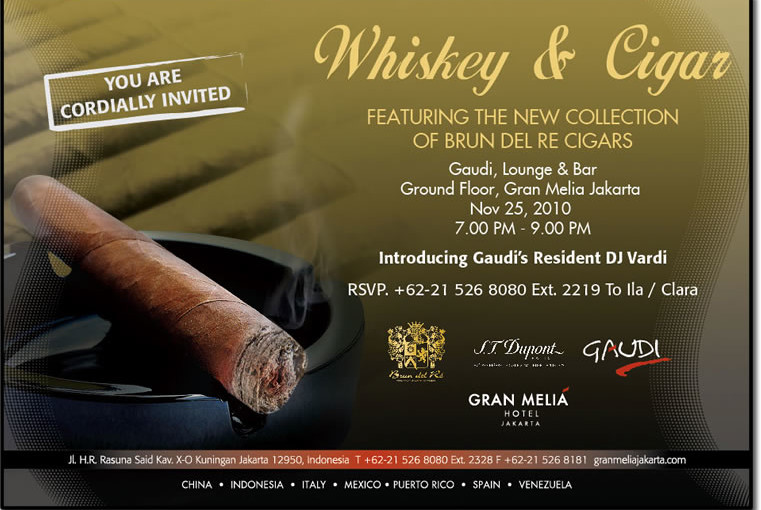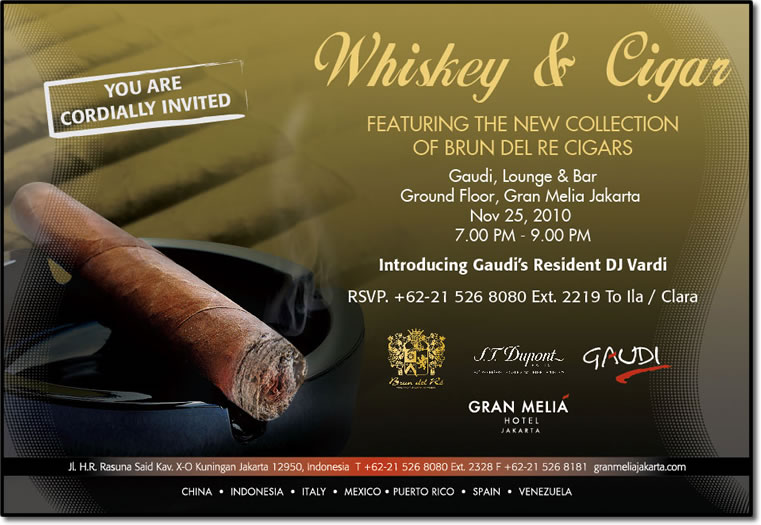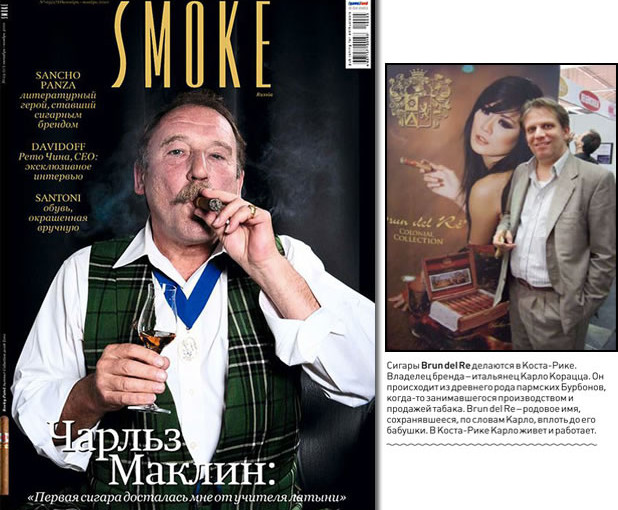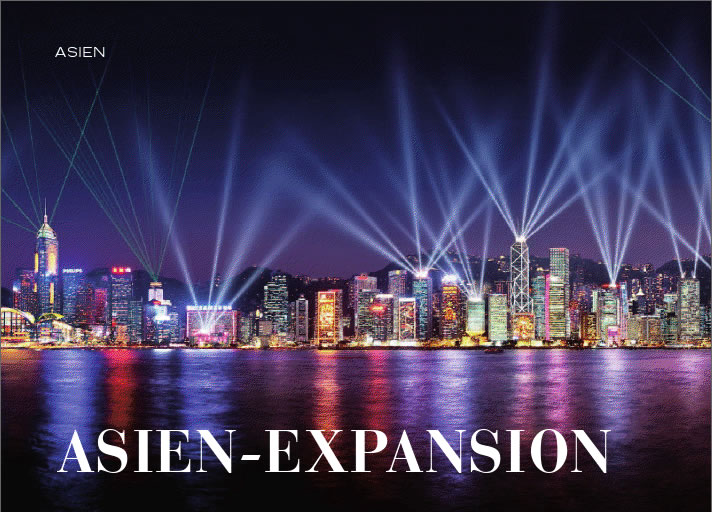
ASIAN EXPANSION
The Far-East is a veritable cigar hub, soon set to rival the other great cigar regions of the world.
The region’s colonial history, and more recently, expatriate community has helped shape the region’s appreciation of premium cigars. Locals from Hong Kong to Indonesia, however, know a good thing when they see it (or taste it) and are fast becoming major cigar consumers with excellent cigar knowledge to match.
Brands such as Davidoff have been active in pockets of Asia for over 20 years, however many smaller cigar makers and distributors are cottoning on to cigar demand in Asia and are clamouring to establish their brands in the booming market.
HONG KONG AND MACAU
Hong Kong’s cigar culture is on par with some of the better known cigar cities of Europe and the Americas. Local residents, the international ex-pat community and mainland Chinese visitors combine to create a very unique cigar culture. Astute cigar aficionados smoke often, but place a huge emphasis on buying and collecting aged cigars.
Across Asia, Cuban cigars and non Cuban brands compete for the attention of smokers. Although Cuban puros are sought by many established smokers, the market for non-Cuban brands is definitely increasing. Eric Piras, Senior Vice President of Altadis USA, is based in Hong Kong and notes that younger occasional smokers are driving demand of non-Cuban brands.
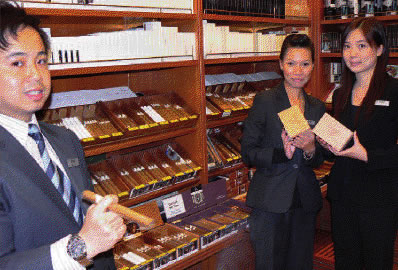 Der Davidoff-Shop im Landmark-Zentrum in Hongkong • Davidoffshop at Landmark Shopping Mall, Hong Kong
Der Davidoff-Shop im Landmark-Zentrum in Hongkong • Davidoffshop at Landmark Shopping Mall, Hong Kong
Der Ferne Osten ist ein
wahrer Cigarren-Umschlagplatz geworden, der bald den anderen großen Cigarrenregionen der Welt Konkurrenz machen wird.
Text und Fotos von Samuel Spurr
Sowohl die koloniale Vergangenheit als auch in jüngerer Zeit die Ausländer haben zur Wertschätzung von Premiumcigarren in asiatischen Ländern beigetragen. Aber auch Einheimische von Hong kong bis Indonesien erkennen eine gute Sache, wenn sie diese sehen (oder kosten) und werden rasch zu wichtigen Cigarrenkonsumenten mit ausgezeichneten Kenntnissen.
Marken wie Davidoff sind seit über zwanzig Jahren in verschiedensten Winkeln Asiens vertreten, doch auch viele kleinere Cigarrennersteller und Vertriebe haben die Nachfrage in Asien mitbekommen und kämpfen darum, ihre Marken am boomenden Markt zu etablieren.
HONGKONG UND MACAO
Hongkongs Cigarrenkultur steht jener in besser bekannten Städten Europas und Amerikas in nichts nach. Ortsansässige Bewohner, die internationale Ausländergemeinde und Besucher aus dem chinesischen Festland haben eine einzigartige Cigarrenkultur geschaffen. Smarte Aficionados rauchen oft, aber legen großen Wert darauf, exquisite, gereifte Cigarren zu kaufen und sammeln.
In ganz Asien buhlen kubanische und nicht-kubanische Marken um die Gunst von Rauchern. Obwohl viele erfahrene Raucher kubanische Puros bevorzugen, steigt die Nachfrage nachnichtkubanischen Marken ganz eindeutig. Eric Piras, Vizepräsident International Sales bei Altadis USA, hat seinen Sitz in Hongkong und beobachtet dort, dass jüngere Gelegenheitsraucher die Nachfrage nach nicht-kubanischen Marken in die Höhe treiben.
Diese Newcomer wurden überwiegend im Ausland erzogen und brennen darauf, neue Cigarren zu entdecken. Sie sind experimentierfreudiger und beschränken sich nicht bloß auf kubanische Marken.“
Piras erklärt ferner, dass es zwei Extreme in der Cigarrenkultur von Hongkong und Macao gibt.
Auf der einen Seite des Spektrums gibt es die Anfänger, die maschinengefertigte und aromatisierte Cigarren ge
Die Wertschätzung von Premiumcigarren in Asien expandiert
Appreciation for premium cigars is increasing in Asia
 Links: Hongkong ist eine wahre Cigarren-Metropole geworden Rechts: Der Cohiba Cigar Divan, ein zentrales Outlet der Pacific Cigar Company in Hongkong
Links: Hongkong ist eine wahre Cigarren-Metropole geworden Rechts: Der Cohiba Cigar Divan, ein zentrales Outlet der Pacific Cigar Company in Hongkong
Left: Hong Kong has beco me a true cigar metropolis
Right: The Cohiba Cigar Divan, a central Outlet of the Pacific Cigar Company in Hong Kong
nießen, auf der anderen Seite – wie das auch in anderen Ländern der Fall ist – die alteingesessenen Raucher, die ihre Marken kennen und je nach Anlass oder Tageszeit entweder kubanische oder dominikanische Cigarren wählen.“ Flor de Copan und Santa Damiana machen, so Piras, bereits starke Umsätze in Hongkong.
Davidoff ist eine bestens etablierte Marke in Hongkong und selbst von jenen, die Cigarren nur am Rande interessieren, leicht zu erkennen. Die Tabakabteilung der Bluebell Group zeichnet unter der Leitung von Laurent de Rougemont für den Vertrieb von Davidoff-Cigarren in Hongkong verantwortlich. „Es ist eine sehr spannende, pulsierende Stadt mit vielen neuen Kunden vom chinesischen Festland, die aufgeschlossen sind, neue Cigarren zu entdecken und zu genießen“, sagt de Rougemont. „Es gibt ein wachsendes Interesse an Vintage-Cigarren, und die Kunden kaufen auch zunehmend mehr Kisten als sie für den täglichen Konsum benötigen, und lassen die Cigarren reifen.“
Man ging davon aus, dass die Kunden aufgrund der jüngsten Anti-Rauchergesetze zu kleineren Formaten greifen würden, doch genau das Gegenteil traf ein – sie rauchen weniger, zünden sich dafür aber lieber eine großformatigere Cigarre an. Die Davidoff Anniversario Nr. 3, Davidoff Millennium Blend Robusto und Davidoff Limited Edition 2009 zählen, so Laurent, zu seinen Spitzenreitern. Ähnliches gilt für kubanische Marken, wobei die Cohiba Siglo VI, Behike 54, Genios Maduro besonders beliebt sind.
Die Fähre zwischen Hongkong und Macao läuft rund um die Uhr im Halbstundentakt aus und bringt Bonvivants innerhalb einer Stunde nach Macao. Die vormalige portugiesische Kolonie ist in der Tat das Las Vegas des Ostens, und man trifft hier auch auf viele bekannte Casino-Namen aus Vegas, darunter Bellagio, Sands und Venetian, doch die Spielsalons sind drei Mal so groß wie jene ihrer Namensvetter in Nevada. Cigarrenliebhaber, die auf Besuch in Hongkong sind, sollten unbedingt den Abstecher über das Südchinesische Meer machen, denn in Macao darf man nach wie vor in Lokalen rauchen, und es gibt hier bereits die verschiedensten Arten von Cigar-Lounges. Im obersten Stockwerk des Sands entsteht eine Playboy Cigar-Lounge und die Bluebell Group wird im selben Casino ihr nunmehr drittes Davidoff-Geschäft eröffnen – ein weiterer Beweis für die Nachfrage nach Premiumcigarren in Macao.
THAILAND
Der Widerstand, auf den Hillman Lentz stieß, als er die Idee unterbreitete, nicht-kubanische Cigarren am thailändischen Markt einzuführen, war Grund genug für den Geschäftsführer und Vorstandsvorsitzenden von ChindAsia, sich mit Leib und Seele dieser Nische zu widmen. „Man sagte mir: ,Was nicht kubanisch ist, lässt sich in Asien nicht verkaufen.‘ Das reichte mir als Motivation. Ich beschloss, dass ich Perdomo-Cigarren nicht nur in Asien verkaufen, sondern sie darüber hinaus zur besten aller Premiumcigarren in Asien machen würde“, erinnert sich Lentz.
So begannen wir also, Cigarren zu verkaufen, und inzwischen haben wir jede Menge davon verkauft.“
Laut Bill Leece, Vizepräsident von ChindAsia, befindet sich Thailands lokale Cigarrenkultur noch im Entwicklungsstadium, wobei es sich bei den meisten der passionierten Cigarrenraucher um Ausländer handelt, die in Thailand leben und arbeiten. Nichtsdestotrotz haben Lentz und Leece festgestellt, dass nach und nach auch immer mehr Thailänder gute Cigarren genießen, wodurch Thailand – gleich nach Indien – die zweithöchste Wachstumsrate bei Cigarrenbsätzen verzeichnen kann.
Thailand hat vor kurzem strenge Anti-Rauchergesetze erlassen, doch paradoxerweise haben diese Regelungen dem Club Perdomo zu einem blühenden Geschäft verholfen, da Cigarrenliebhaber nach komfortablen Orten suchen, wo sie mit einer Cigarre und einem Getränk ihrer Wahl ausspannen können. „Der Club Perdomo Bangkok ist ein Privatklub, und wir organisieren eine Reihe von Wein- und Single Malt Whisky-Präsentationen für unsere Mitglieder.
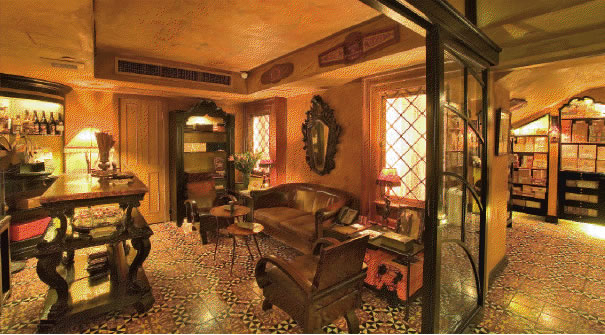
“These newcomers are predominantly educated abroad, and eager to discover new cigars; they have a more curious spirit and do not stick to Cubans only.” Piras further explains that there are two extremes in the cigar culture of Hong Kong and Macau. “At one end of the spectrum, beginners enjoy machine-made and flavored cigars, while at the other end, as in other developed countries, seasoned cigar smokers who know their brands, choose either Cuban or Dominican cigars depending on the occasion and time of the day.” Flor de Copan and Santa Damiana are making moves in Hong Kong according to Piras.
Davidoff is a well-established brand in Hong Kong and is easily recognised by those with only just a passing interest in cigars. Bluebell Group’s Tobacco division, headed by Laurent de Rougemont, is responsible for distributing Davidoff cigars in Hong Kong. “The city is very exciting, very vibrant, with lots of new customers from mainland China willing to discover and enjoy cigars”, says de Rougemont.
“There is a growing interest in buying vintage cigars and customers are also starting to buy more boxes than their normal daily consumption in order to age them.” It was thought that recent anti-smoking legislation would move customers towards smaller cigars, but the opposite has proven to be true – customers are choosing to smoke fewer cigars, but are lighting up larger sticks when they decide to enjoy a cigar. Laurent notes that Davidoff Anniversario No 3, Davidoff Millennium Blend Robusto and the Davidoff Limited Edition 2009 are among his top sellers. He comments that the same can be said for Cuban cigars, with Cohiba Siglo VI, Behike 54, Genios Maduro all being very popular.
The ferry operating between Hong Kong and Macau departs every half hour around the clock
and delivers bon vivants to Macau in just under an hour. The former Portuguese colony is indeed the Las Vegas of the East, with many well-known Vegas casinos such as Bellagio, the Sands and Venetian found there, however gambling floors are three times the size of their namesakes back in Las Vegas. Cigar lovers visiting Hong Kong should make the trip across the South China Sea, as Macau still allows indoor smoking and is fast welcoming all manner of cigar lounges.
A playboy cigar lounge is opening on the top floor of the Sands casino while the Bluebell Group is opening its third Davidoff store in the same casino – testament to the demand for premium cigars in Macau.
THAILAND
The opposition Hillman Lentz encountered towards the idea of introducing a non-Cuban cigar to the Thai market was motivation enough for the CEO and Chairman of ChindAsia, to put his heart and soul behind the brand.
“They said ‘it’s not Cuban, it won’t sell in Asia’ which was enough motivation for me to decide I would not only sell Perdomo Cigars in Asia, but I would make it the most premium of premium cigars in Asia”, says Lentz. “So we started selling cigars and we sold a lot of them.”
According to Bill Leece, ChindAsia’s Vice President, Thailand’s local cigar culture is still developing, with most avid cigar smokers being expatriates living and working in Thailand.
However Lentz and Leece are seeing more and more Thais starting to enjoy good cigars – helping Thailand to the 2nd highest cigar sale growth rate in Asia, coming in just after India. Thailand recently enacted strict smoking laws, but these laws have paradoxically helped Club Perdomo’s business as
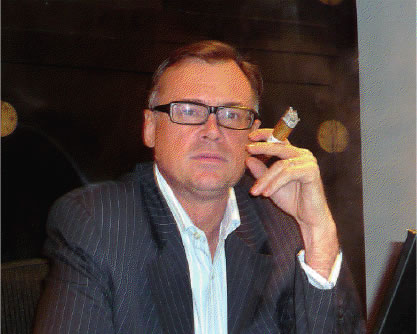 Kritische Stimmen, die meinten: „Was nicht kubanisch ist, lässt sich in Asien nicht verkaufen“ waren eine noch größere Motivation für Hillman Lentz, Perdomo-Cigarren auf den Markt zu bringen – und mit Erfolg!
Kritische Stimmen, die meinten: „Was nicht kubanisch ist, lässt sich in Asien nicht verkaufen“ waren eine noch größere Motivation für Hillman Lentz, Perdomo-Cigarren auf den Markt zu bringen – und mit Erfolg!
The argument that what was not Cuban would not sell in Asia was an even greater motivation for Hillman Lentz to launch Perdomo cigars on the market – with success!
Zu letzt veranstalteten wir zum Beispiel eine Glenmorangie WhiskyVerkostung und im Juli gab es eine von französischen Weinen“, so Leece. „Abgesehen davon, dass immer mehr Thailänder Premiumcigarren genießen, wissen die Kunden auch zunehmend nicht-kubanische Cigarren zu schätzen. Viele asiatische Aficionados haben – im Gegensatz zu Amerikanern – sowohl Zugang zu kubanischen als auch zu nicht-kubanischen Marken und erkennen, dass die kubanische Cigarren-Qualität nicht dem Hype ihres Markts entspricht.“
Das Ziel von ChindAsia ist es, zehn bis zwanzig „Club Perdomos“ in ganz Asien zu schaffen, mit gegenseitigen Mitgliedschafts-Privilegien in jedem der Clubs. „Wir haben bereits bemerkt, dass der Club für viele Leute zu einem praktischen Ort für Geschäftsabwicklungen geworden ist. Mit der Schaffung von weiteren Clubs in der Region kann die Effektivität des Club-Netzwerks exponentiell gesteigert werden“, meint Leece.
SINGAPUR
Wishnu Bintang, regionale Generaldirektorin der Pacific Cigar Company, hat tagtäglich mit Asiens schärfster Tabakgesetzge- bung zu tun. Sie berichtet, dass Cigar-Lounges nur zehn Pro- zent ihrer Räumlichkeiten in einen geschlossenen Raucherbe- reich umgestalten können und nur zwanzig Prozent des Außen- bereichs einer Bar oder eines Restaurants eine ausgewiesene Raucherzone sein dürfen. „Das Gute an Singapur ist, dass es hier nach wie vor viele Bars und Restaurants mit Außenberei- chen gibt. Man muss halt manchmal nur auf das Innen-Am- biente einer Cigarlounge verzichten“, meint Bintang. Das Ge- setz ist seit drei Jahren in Kraft und hat – wie auch nicht an- ders zu erwarten war – Cigarrenraucher nicht wirklich davon abgehalten, ihrem Genuss zu frönen. Es gibt eine riesige Anzahl von Cigarrenhändlern in Sin- gapur, die garantieren, dass Cigarrenfans bestens versorgt sind. Dutyfree-Geschäfte haben ein besseres Sortiment denn je zuvor. Gleichzeitig finden jene, die das traditionel- le Erlebnis und Ritual der Cigarrenauswahl bevorzugen, hier auch erstklassige Cigarrengeschäfte. „Es ist ein hart umkämpfter Markt. Jeder Produzent aus jedem Winkel der cigar lovers are looking for comfortable venues where they can relax with a cigar and their tipple of choice. “Club Per- domo Bangkok is a members-only club, so we organize a number of wine and single malt appreciation events for our members. For example, we recently hosted a Glenmorangie whisky tasting and we hosted a French wine tasting in July”, says Leece. “In addition to seeing more local Thais be- ginning to appreciate premium cigars, we are also seeing consumers starting to have a greater appreciation for non- Cuban cigars. Many Asian cigar lovers, who unlike Ameri- cans, have access to both Cuban and non-Cuban cigars, are realizing that Cuban cigar quality does not match their mar- ket hype.” ChindAsia aims to create 10 to 20 “Club Perdomos” across Asia, with reciprocal membership privileges at all of the clubs. “We’ve already seen that the club has become a very convenient place for people to do business, and as we grow more clubs across the region, the value of the network ef- fect of these clubs will grow exponentially”, says Leece. SINGAPORE Wishnu Bintang, Regional General Manager for the Pacific Cigar Company deals with Asia’s strictest tobacco legisla- tion every day. She reports that cigar lounges can only have 10% of their floor space converted to an enclosed smoking area and only 20% of a bar or restaurants’ outdoor area can be assigned as a smoking area. “The good thing is that Singapore still has plenty bars and restaurants with alfres- co areas. You just have to sometimes forgo the ambiance of a cigar lounge”, says Bintang. The legislation has been in ef- fect for three years and as would be the case, has not really stopped people enjoying cigars. There is a huge range of cigar retailers in Singapore, ensu-
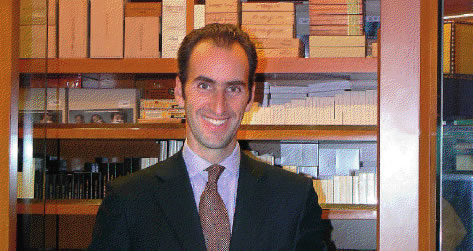 Laurent de Rougemont von der Bluebell Group bemerkt, dass es ein wachsendes Interesse an Vintage-Cigarren gibt
Laurent de Rougemont von der Bluebell Group bemerkt, dass es ein wachsendes Interesse an Vintage-Cigarren gibt
Laurent de Rougemont of the Bluebell Group notes the growing inte- rest in vintagecigars
Welt versucht, hier seine Cigarren zu verkaufen, was wie- derum gute Deals für die Konsumenten bedeutet!“
Jeder Produzent aus jedem Winkel der Welt“ bezieht sich ganz eindeutig auf Unternehmen wie etwa die Bluebell Group. Anfang des Jahres eröffnete Bluebell sein zweites Da- vidoff-Geschäft in der Takashimaya Shopping Mall und ein weiteres ist im Marina Bay Sands-Casino geplant. Das Casi- no ist eine Novität für Singapur, dessen frühere negative Ein- stellung gegenüber dem Glücksspiel viele davon abhielt, hier Casinos zu eröffnen. Laut de Rougemont von Bluebell wird in einem Teil des Casinos Rauchen erlaubt sein – eine über- raschende Genehmigung der Regierung, aber eine, die zwei- felsohne jede Menge Cigarren-Liebhaber anziehen wird.
INDONESIEN
Indonesien ist Tabak nicht fremd. Die Pflanzen werden in ver- schiedensten Regionen der Inselgruppe seit mehr als 400 Jah- ren angebaut, als die Portugiesen diese erstmals aus Südame- rika einführten. Obwohl vorwiegend Zigarettentabak produ- ziert wird, sind die Blätter aus Java und Sumatra in der Ci- garren-Welt bestens bekannt und empfohlen.
Indonesiens Cigarrenkultur entwickelt sich Schritt für Schritt weiter“, meint Carlo Corazza von Brun Del Re, der im Oktober 2009 Brun Del Res erste asiatische Cigarrenbou- tique in Jakartas Gran Melia-Hotel eröffnete. „Wir sehen un- sere Fortschritte eindeutig bei den Konsumenten, die immer mehr unserer Cigarren kaufen. Einheimische Cigarrenrau- cher probieren diverse Marken aus und demonstrieren damit, dass sie bereit sind, mehr über die verschiedenen Arten von Tabak zu lernen. Das hilft natürlich dem gesamten Cigarren- markt und zieht kontinuierlich Gäste in unsere Lounge.“
Natürlich läuft nicht immer alles ganz reibungslos ab, denn die Einfuhrsteuer für Cigarren ist in Indonesien relativ hoch. „Die in- donesische Tabaksteuer hat selbstverständlich Auswirkungen auf Brun Del Re, aber bei echten Cigarrenliebhabern spielt der Preis keine allzu große Rolle, solange die Qualität der Cigarre passt.“ Wie viele andere Produzenten, die in Asien Geschäfte eröffnen, hat sich Corazza ein Land ausgesucht, in dem es bereits eine große Affinität zu Cigarren und Tabak gibt. „Asien ist ein wich- tiger Zukunftsmarkt. Wir haben Indonesien gewählt, weil es ein bedeutender Tabakproduzent ist und eine große Cigarrenkultur hat. Wir machen Fortschritte, und Brun Del Re wächst Schritt für Schritt.“ Brun Del Res zunehmende Zahl an VIPs genoss jüngst einen Abend mit feinen Speisen und Cigarren – nur knapp ein Jahr nach der Geschäftseröffnung erwies sich diese Veranstaltung als riesiger Erfolg und wichtiger Meilenstein für Brun Del Re und den ortsansässigen Vertrieb Degiri.
Tambo-Cigarren sind erst seit knapp über zwei Jahren auf dem Markt, aber die Marke hat sich bereits als Indonesiens bedeu- tendste selbstgezogene Cigarre positioniert. Robert Tomko, Gründer von Tambolaka Natural Tobaccos, ließ einen profes- sionellen Cigarrenroller aus Kuba einfliegen, um das Personal in der jahrhundertalten Fabrik des Unternehmens zu schulen, während er selbst viel Zeit in Honduras verbrachte, wo er viel von Cigarrenmeistern lernte. „Wir verwenden Tabak aus Java und Sumba. Die traditionellen Farmer haben den äußerst reich- haltigen Tabak über Jahrhunderte hinweg weiterentwickelt, und wir arbeiten mit ihnen zusammen, um ihren traditionellen organischen Anbau und ihre Reifemethoden beizubehalten.“
Indonesien produziert mehrere Cigarren für den Export- markt, doch unsere werden gemäß der weltweiten Normen für Premiumcigarren hergestellt“, so Tomko. „Die anderen haben nicht die einzigartige Einlage, die wir verwenden, und unser Tabak wird zudem über fünf Jahre gereift.“
Tambo organisiert Cigarrenabende in ganz Indonesien und das Unternehmen sponsert auch den Bali Cigar Club, der zwei Mal die Woche Treffen in Kuta und Ubud veranstaltet, um exquisiten Rauchgenuss zu fördern. „Erlesene Kisten und elegante Bänder sind aber nicht mehr so wichtig, sobald die Cigarren einmal angezündet sind“, meint Tomko. „Als Bou- tique-Produzent erstklassiger Cigarren finde ich es faszinie- rend, die Gesichter der Menschen zu beobachten, wenn sie sich das erste Mal eine unserer Cigarren anzünden – nach ein paar Zügen leuchten ihre Augen nur so! Unsere Cigarren sind eine Überraschung, eine Entdeckung, und vor allem ein Ge- nuss zu einem durchaus erschwinglichen Preis.“
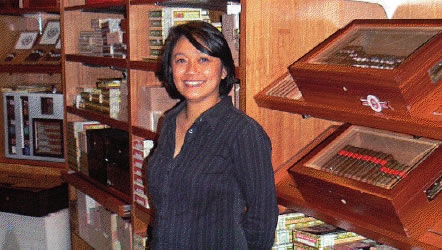 Wishnu Bintang, regionale Generaldirektorin der Pacific Cigar Company, ist mit heftiger Konkurrenz konfrontiert. „Jeder Produzent aus jedem Winkel der Welt versucht, hier seine Cigarren zu verkaufen, was aber wiederum gute Deals für die Konsumenten bedeutet“
Wishnu Bintang, regionale Generaldirektorin der Pacific Cigar Company, ist mit heftiger Konkurrenz konfrontiert. „Jeder Produzent aus jedem Winkel der Welt versucht, hier seine Cigarren zu verkaufen, was aber wiederum gute Deals für die Konsumenten bedeutet“
Wishnu Bintang, regional General director of the Pacific Cigar Company, is facing consi- derable competition. “Every pro- ducer from every corner of the earth is trying to sell his cigars here, which in turn means good deals for consumers.”
ring that cigar fans are well catered to. Duty free stores are carrying a selection better than ever before, but those who still value the experience and the ritual of choosing their ci- gars in the traditional manner, will find that the cigar shop experience is first class. “It is a tough market here – every producer from every corner of the world is trying to sell their cigars, but this means a good deal for consumers!” “Every producer from every corner of the world” is most definitely referring to operators such as the Bluebell group. Earlier this year, Bluebell opened its second Davidoff shop at Takashimaya shopping mall and is in the process of ope- ning another at the Marina Bay Sand’s casino. The casino is a first for Singapore whose previous anti-gambling stance stopped casinos from opening up. According to Bluebell’s de Rougemont, part of the casino will allow indoor smo- king, a surprising allowance from the government, but one which will no doubt attract plenty of cigar lovers.
INDONESIA
Indonesia is no stranger to tobacco. The plant has been grown in various regions of the archipelago for over 400 years since the Portuguese first introduced it from the Ame- ricas. Predominantly producing tobacco for cigarettes, In- donesia’s Java and Sumatra leaf strains are well-known and referenced around the cigar world.
“Indonesia’s cigar culture is growing, step by step,” says Brun Del Re’s Carlo Corazza, who In October 2009, ope- ned Brun Del Re’s first Asian cigar boutique at Jakarta’s Gran Melia Hotel. “We clearly see the progress we’re ma- king through our clients who are smoking more and more of our cigars. Local cigar smokers are looking to try diffe- rent brands, demonstrating that they are willing to learn more about different types of tobacco. This of course helps the overall cigar market and continually attracts customers to our lounge.
” It hasn’t been all smooth sailing of course, with Indonesia taxing cigar importation quite highly. “The Indonesian go- vernment’s tobacco import tax impacts Brun Del Re, how- ever real cigar lovers don’t worry too much about price, as long as the cigar is quality.”
Like most other producers setting-up shop in Asia, Corazza has targeted a country that already has a close affinity to ci- gars and tobacco. “Asia is a very important market for the future. We chose Indonesia because it’s a big tobacco produ- cer and there is a big cigar culture there. We are making pro- gress and Brun Del Re is growing step by step.” Brun Del Re’s growing base of VIP guests recently enjoyed a night of fine food and cigars – after opening less than a year ago, the evening was considered a huge success and important mile- stone for Brun Del Re and local distributor Degiri.
Tambo cigars have only been on the market for just over two years, but already the brand has positioned itself as Indone- sia’s premier home-grown cigar. Robert Tomko, founder of Tambolaka Natural Tobaccos, brought in a professional rol- ler from Cuba to train staff at the company’s century-old ci- gar rolling factory, and also spent a lot of time in Honduras where he was able to learn from master cigar-makers.
“We use tobacco sourced from the Java and Sumba islands of Indonesia. The traditional farmers have been developing the extremely rich tobacco for centuries and we work with them to maintain their traditional organic growing and aging methods.”
“Indonesia makes several cigars for the export market but our cigars are manufactured to global premium cigar stan- dards”, says Tomko. “The others lack the unique filler that we employ, and our tobacco is aged for five years.”
Tambo offers cigar nights throughout Indonesia, and the company also sponsors the Bali Cigar Club which meets twice weekly in Kuta and Ubud to further the enjoyment of elegant smoking. “Fine boxes and elegant bands mean no- thing once flame and cigar meet”, says Tomko. “As a bou- tique producer of excellent cigars it is quite a thrill to watch the face of those who light up one of our cigars for the first time – after a couple of puffs their eyes light up! Our cigars are a surprise, a discovery, and most of all, a great pleasure at a very affordable price.”
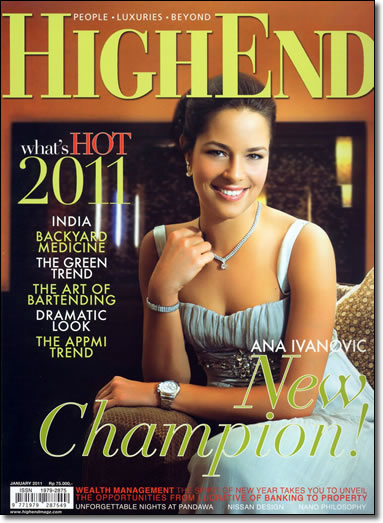

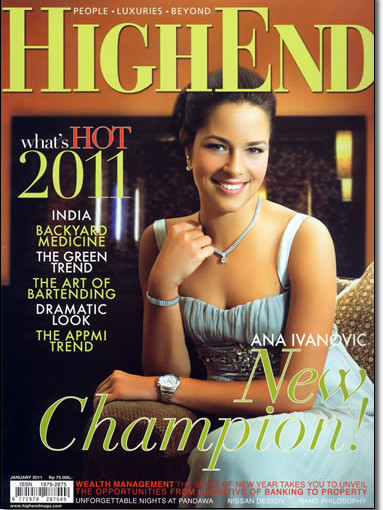

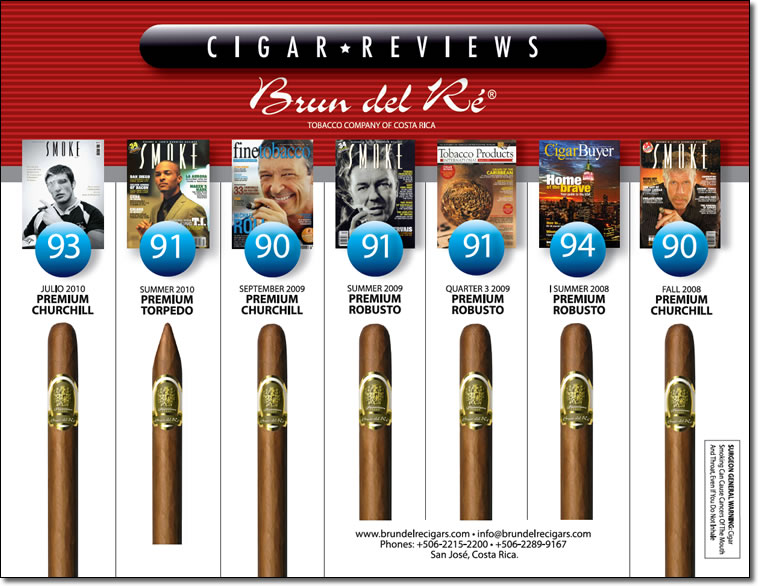
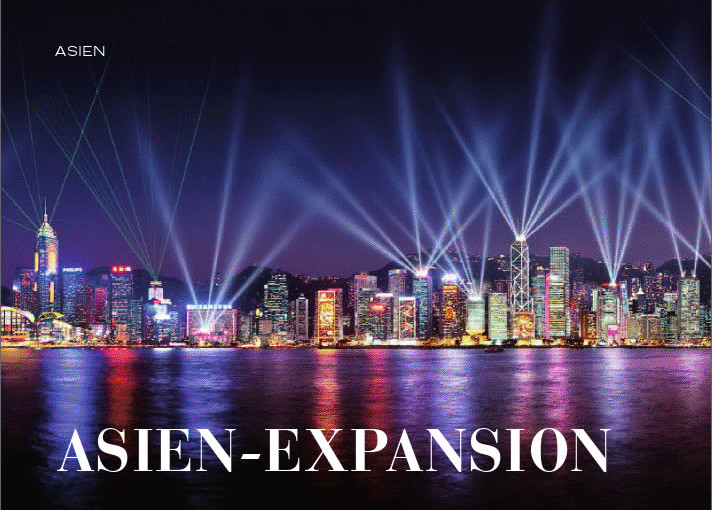

 Der Davidoff-Shop im Landmark-Zentrum in Hongkong • Davidoffshop at Landmark Shopping Mall, Hong Kong
Der Davidoff-Shop im Landmark-Zentrum in Hongkong • Davidoffshop at Landmark Shopping Mall, Hong Kong Links: Hongkong ist eine wahre Cigarren-Metropole geworden Rechts: Der Cohiba Cigar Divan, ein zentrales Outlet der Pacific Cigar Company in Hongkong
Links: Hongkong ist eine wahre Cigarren-Metropole geworden Rechts: Der Cohiba Cigar Divan, ein zentrales Outlet der Pacific Cigar Company in Hongkong
 Kritische Stimmen, die meinten: „Was nicht kubanisch ist, lässt sich in Asien nicht verkaufen“ waren eine noch größere Motivation für Hillman Lentz, Perdomo-Cigarren auf den Markt zu bringen – und mit Erfolg!
Kritische Stimmen, die meinten: „Was nicht kubanisch ist, lässt sich in Asien nicht verkaufen“ waren eine noch größere Motivation für Hillman Lentz, Perdomo-Cigarren auf den Markt zu bringen – und mit Erfolg! Laurent de Rougemont von der Bluebell Group bemerkt, dass es ein wachsendes Interesse an Vintage-Cigarren gibt
Laurent de Rougemont von der Bluebell Group bemerkt, dass es ein wachsendes Interesse an Vintage-Cigarren gibt
 Wishnu Bintang, regionale Generaldirektorin der Pacific Cigar Company, ist mit heftiger Konkurrenz konfrontiert. „Jeder Produzent aus jedem Winkel der Welt versucht, hier seine Cigarren zu verkaufen, was aber wiederum gute Deals für die Konsumenten bedeutet“
Wishnu Bintang, regionale Generaldirektorin der Pacific Cigar Company, ist mit heftiger Konkurrenz konfrontiert. „Jeder Produzent aus jedem Winkel der Welt versucht, hier seine Cigarren zu verkaufen, was aber wiederum gute Deals für die Konsumenten bedeutet“ 
